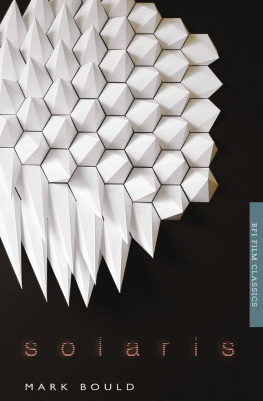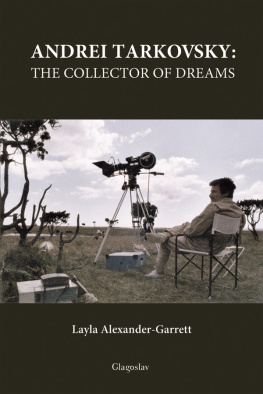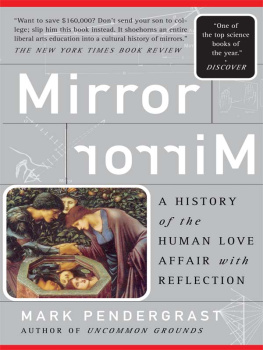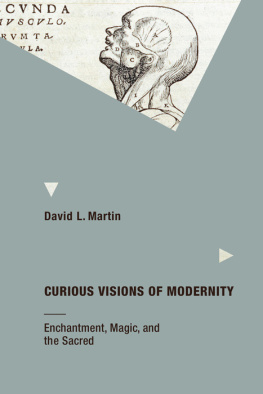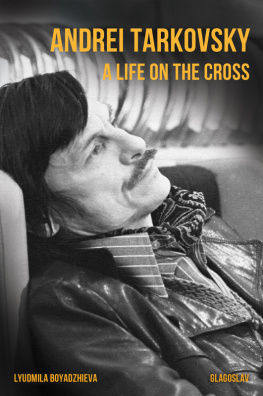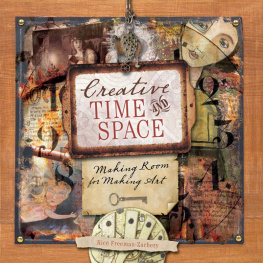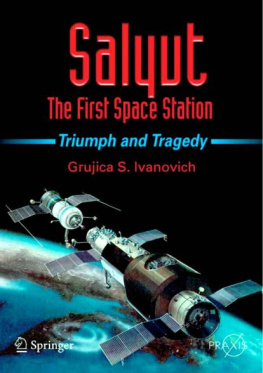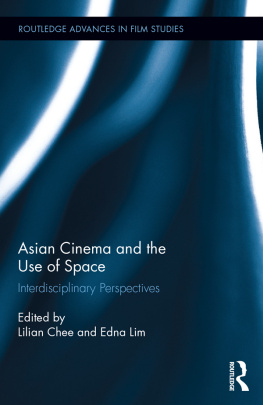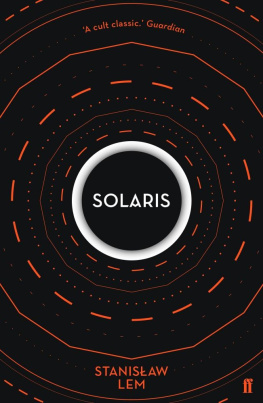Nariman Skakov is Assistant Professor of Slavic Languages and Literatures at Stanford University.
Published and forthcoming in KINO: The Russian and Soviet Cinema Series
Series Editor: Richard Taylor
Advisory Board: Birgit Beumers, Julian Graffy, Denise Youngblood
Alexander Medvedkin: kinofile Filmmakers Companion
Emma Widdis
Central Asian Cinema: A Complete Companion
Edited by Michael Rouland and Gulnara Abikeyeva
Cinema and Soviet Society: From the Revolution to the Death of Stalin
Peter Kenez
The Cinema of Alexander Sokurov
Edited by Birgit Beumers and Nancy Condee
The Cinema of Tarkovsky: Labyrinths of Space and Time
Nariman Skakov
The Cinema of the New Russia
Birgit Beumers
Dziga Vertov: Defining Documentary Film
Jeremy Hicks
Eisenstein on the Audiovisual: The Montage of Music, Image
Robert Robertson
Film Propaganda: Soviet Russia and Nazi Germany (second, revised edition)
Richard Taylor
Forward Soviet!: History and Non-Fiction Film in the USSR
Graham Roberts
Real Images: Soviet Cinema and the Thaw
Josephine Woll
Russia on Reels: The Russian Idea in Post-Soviet Cinema
Edited by Birgit Beumers
Savage Junctures: Sergei Eisenstein and the Shape of Thinking
Anne Nesbet
Soviet Cinema: Politics and Persuasion under Stalin
Jamie Miller
The Stalinist Musical: Mass Entertainment and Soviet Cinema
Richard Taylor
Vsevolod Pudovkin: Classic Films of the Soviet Avant-Garde
Amy Sargeant
Queries, ideas and submissions to:
Series Editor, Professor Richard Taylor: rtkino@hotmail.co.uk
Cinema Editor at I.B. Tauris, Philippa Brewster: philippabrewster@gmail.com
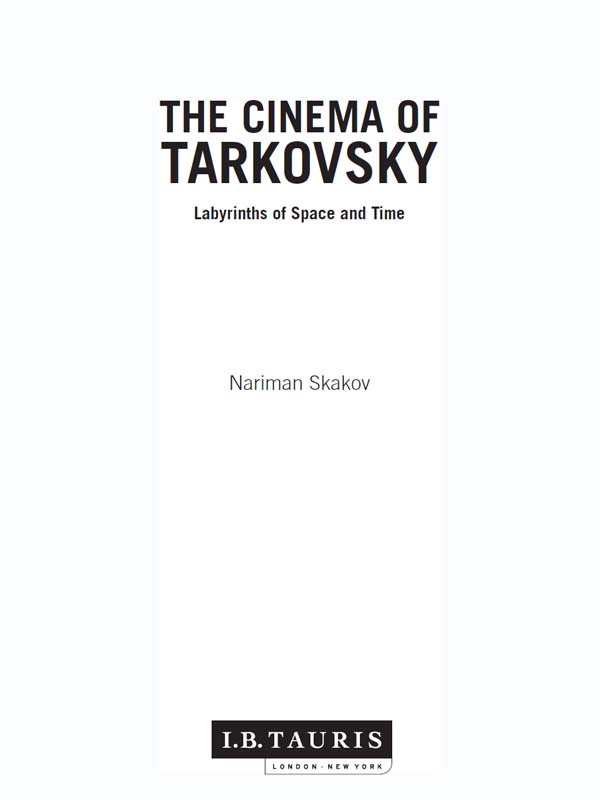
Published in 2012 by I.B. Tauris & Co Ltd
6 Salem Road, London W2 4BU
175 Fifth Avenue, New York NY 10010
www.ibtauris.com
Distributed in the United States and Canada
Exclusively by Palgrave Macmillan
175 Fifth Avenue, New York NY 10010
Copyright 2012 Nariman Skakov
The right of Nariman Skakov to be identified as the author of this work has been asserted by him in accordance with the Copyright, Designs and Patent Act 1988.
All rights reserved. Except for brief quotations in a review, this book, or any part thereof, may not be reproduced, stored in or introduced into a retrieval system, or transmitted, in any form or by any means, electronic, mechanical, photocopying, recording or otherwise, without the prior written permission of the publisher.
ISBN | 978 1 84885 630 1 (pb) |
978 1 84885 629 5 (hb) |
eISBN 978 0 85773 079 4
A full CIP record for this book is available from the British Library
A full CIP record is available from the Library of Congress
Library of Congress Catalog Card Number: available
To my mother
KINO: THE RUSSIAN CINEMA
GENERAL EDITORS PREFACE
C inema has been the predominant art form of the first half of the twentieth century, at least in Europe and North America. Nowhere was this more apparent than in the former Soviet Union, where Lenins remark that of all the arts, cinema is the most important became a clich and where cinema attendances were until recently still among the highest in the world. In the age of mass politics Soviet cinema developed from a fragile but effective tool to gain support among the overwhelmingly illiterate peasant masses in the civil war that followed the October 1917 Revolution, through a welter of experimentation, into a mass weapon of propaganda through entertainment that shaped the public image of the Soviet Union both at home and abroad and for both elite and mass audiences and latterly into an instrument to expose the weaknesses of the past and present in the twin processes of glasnost and perestroika. Now the national cinemas of the successor republics to the old USSR are encountering the same bewildering array of problems, from the trivial to the terminal, as are all the other ex-Soviet institutions.
Cinemas central position in Russian and Soviet cultural history, and its unique combination of mass medium, art form and entertainment industry, have made it a continuing battlefield for conflicts of broader ideological and artistic significance, not only for Russia and the Soviet Union, but also for the world outside. The debates that raged in the 1920s about the relative merits of documentary as opposed to fiction film, of cinema as opposed to theatre or painting, or of the proper role of cinema in the forging of post-Revolutionary Soviet culture and the shaping of the new Soviet man, have their echoes in current discussions about the role of cinema vis--vis other art forms in effecting the cultural and psychological revolution in human consciousness necessitated by the processes of economic and political transformation of the former Soviet Union into modern democratic and industrial societies and states governed by the rule of law. Cinemas central position has also made it a vital instrument for scrutinising the blank pages of Russian and Soviet history and enabling the present generation to come to terms with its own past.
This series of books intends to examine Russian, Soviet and ex-Soviet films in the context of Russian, Soviet and ex-Soviet cinemas, and Russian, Soviet and ex-Soviet cinemas in the context of the political history of Russia, the Soviet Union, the post-Soviet space and the world at large. Within that framework the series, drawing its authors from both East and West, aims to cover a wide variety of topics and to employ a broad range of methodological approaches and presentational formats. Inevitably this will involve ploughing once again over old ground in order to re-examine received opinions, but it principally means increasing the breadth and depth of our knowledge, finding new answers to old questions and, above all, raising new questions for further enquiry and new areas for further research.
The continuing aim of this series is to situate Russian, Soviet and ex-Soviet cinema in its proper historical and aesthetic context, both as a major cultural force and as a crucible for experimentation that is of central significance to the development of world cinema culture. Books in the series strive to combine the best of scholarship past, present and future with a style of writing that is accessible to a broad readership, whether that readerships primary interest lies in cinema or in political history.
Richard Taylor
Swansea, Wales
CONTENTS
ILLUSTRATIONS
Chapter 1
Chapter 2
Chapter 3
Chapter 4
Chapter 5
Chapter 6
Chapter 7
ACKNOWLEDGEMENTS
I would like to express my sincere gratitude to Julian Graffy, who has been my inspiring mentor and patient reader for the last eight years. This book could not have been written without his guidance.
Nancy Ruttenburg provided scrupulous, imaginative and sympathetic commentary on the manuscript a dream for any author. Julie Draskoczy, Kiersten Jakobsen, Folahan Olowoyeye, Tom Roberts, Natasha Synessios and Richard Taylor shared with me their illuminating insights and set productive challenges. My editors at I.B. Tauris, Philippa Brewster and Cecile Rault, have provided a great deal of support and encouragement. I am also grateful to Anna Lordan for her patient proofreading. Any mistakes that remain are my responsibility.
Next page

